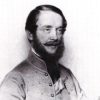Lajos Kossuth

Lajos Kossuth
Lajos Kossuth de Udvard et Kossuthfalvawas a Hungarian lawyer, journalist, politician and Governor-President of the Kingdom of Hungary during the revolution of 1848–49. With the help of his talent in oratory in political debates and public speeches, Kossuth emerged from a poor gentry family into regent-president of Kingdom of Hungary. As the most influential contemporary American journalist Horace Greeley said of Kossuth: “Among the orators, patriots, statesmen, exiles, he has, living or dead, no superior.” Kossuth's powerful English and American...
NationalityHungarian
ProfessionLawyer
Date of Birth19 September 1802
Neutrality, as a lasting principle, is an evidence of weakness.
The era of Christianity peace, brotherhood, the Golden Rule as applied to governmental matters is. yet to come, and when it comes, then, and then only, will the future of nations be sure.
I have to thank the People, the Congress, and the Government of the United States for my liberation.
It is the surmounting of difficulties that makes heroes.
Your generous part in my liberation is taken by the world for the revelation of the fact, that the United States are resolved not to allow the despots of the world to trample on oppressed humanity.
I will not become a Napoleon nor an Alexander, and labour for my own ambition; but I will labour for freedom and for the moral well-being of man.
Even in political considerations, now-a-days, you have stronger motives to feel interested in the fate of Europe than in the fate of the Central or Southern parts of America.
I believe that the confidence of Hungary in me is not shaken by misfortune nor broken by my calumniators.
I consider that it is on instruction and education that the future security and direction of the destiny of every nation chiefly and fundamentally rests.
Fear must rule in a despotism.
The tongue of man is powerful enough to render the ideas which the human intellect conceives; but in the realm of true and deep sentiments it is but a weak interpreter. These are inexpressible, like the endless glory of the Omnipotent.
Bravery is often too sharp a spur.
The protection of God cannot, without sacrilege, be invoked but in behalf of justice and right.
No man can force the harp of his own individuality into the people's heart; but every man may play upon the chords of the people's heart, who draws his inspiration from the people's instinct.